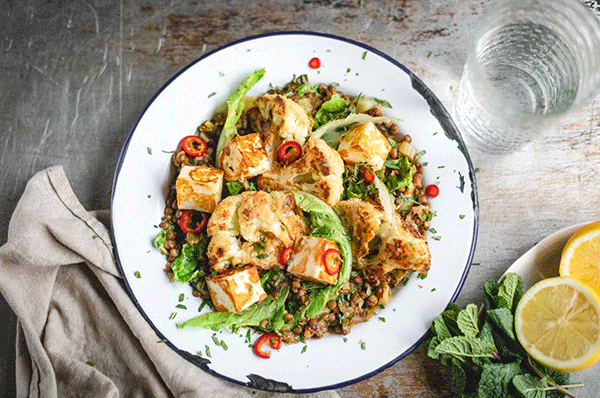Food choices are decided by budget, cultural or personal preferences, as well as for some people, health and environmental considerations. Luckily, there are some crossovers between those last two that makes it possible to buy and eat food that is healthy for ourselves, and healthy for the planet.
And there are plenty of reasons to tackle both, when industrial agriculture is one of the leading cause of habitat loss in the UK, and diet-related illnesses like diabetes or obesity cause more preventable deaths than smoking across the world.
But it’s not always easy to know where to start. And as Professor Simon Steenson of the British Nutrition Federation outlined recently: “There’s no ‘one size fits all’.
“Moderate meat consumption can play a role in a healthy, sustainable diet,” he said, adding that plants, beans, nuts, wholegrains, fish and seafood are all important elements, while meat, high fat foods and alcohol should be generally lower.
“What about vegan diets? They could lead to large reductions in greenhouse gas emissions and potential health benefits. But they can also increase our water footprint, they are unrealistic for some people, and there are nutritional implications. Iron, zinc, iodine, Vitamin A and B12 are more bioavailable in animal foods,” said Steenson.

“Healthy and sustainable diets need to consider environmental impact, but also nutrition,” he added.
Luckily, there are a few easy and sustainable steps to tackle both:
Follow the NHS Eatwell Guide, a “familiar and sensible guide” for a plant-rich diet, a predominantly plant-rich diet with animal foods in moderation. If possible, buy meat that has been raised organically without chemicals and to top animal welfare standards, or explore what regenerative farming is so you can ask the right questions at your local butcher or farmers’ market.
Eat more fruit and veg. They are the “cornerstone” of a healthy diet, and at least five portions a day can reduce the risk of disease and ensure intake of essential vitamins. Eating a variety of veg, not just the same ones, is equally important to provide the full range of nutrients.
Tips: Swap out snacks for something healthier, add fruit to breakfast or add canned or frozen veg to meals.
Rebalance to choose protein sources from plants, alongside protein sources from animals.
Tips: Add pulses or legumes like chickpeas, lentils or British-grown fava beans, as a base for salads or soups.
Think about the overall nutrient composition of plant-based alternatives.
Tips: Add things like unsalted nuts or seeds as a snack, which are full of healthy unsaturated fats and protein, plus good sources of fibre, potassium, selenium, magnesium, thiamin, iron and zinc. And think about the sourcing of ingredients as well as whole foods – spices, seeds and herbs all have the same supply chains as other foods.
Limit foods high in fat, salt and/or sugar.
Tips: Be more portion-wise and think about quantities. Plan ahead to make healthier snacks, switching to things like wholemeal toast with peanut butter or lower-sugar wholegrain cereal and milk.
Choose sustainable sources of fish and seafood. It’s recommended to eat at least two 140g portions of fish a week, with at least one oily fish like mackerel.
Tips: Eat a broader range of species, look for certifications or more local guides to your area like the Cornwall Good Seafood Guide, or Marine Conservation Society.
Waste less food and drink. Irrespective of diet, reducing waste is essential as it accounts for 10 per cent of greenhouse gas emissions from our diets. Less than a third of the UK recognise the link between food waste and climate change.
Tips: Plan meals before shopping, set your fridge temperature correctly, use food and drink labels and learn how to store each type of food.












Always amazed that NHS Eatwell diet comes up as more sustainable because it is plant-rich. Just shows we can be healthy and green!
One can, of course, cut out snacks altogether. Research by Prof Tim Spector and his team (KCL) has shown them to be unnecessary and potentially fattening. Our society is obsessed with them, largely because the food industry promotes them as necessary.
I’d not encountered Prof Tim Spector until recently, but I found Bee Wilson’s review of his book in the Guardian to be really interesting and articulated complex issues with such clarity.
“The human relationship with food is something far too “complex and intricate” to be reduced to calories in and calories out.”
What he says about the breakfast industry peddling the tagline of ‘the most important meal of the day’ is exactly the same for the snack industry. In 2019 it was worth £3.2 billion. It’s big money, and a lot of money is spent convincing us and tempting us with products that have been engineered with care to be absolutely delicious, appealing to our hunter-gatherer instincts to delight at energy-dense food.
But interestingly, it’s time and lifestyles that are a big factor according to research:
https://harris-interactive.co.uk/wp-content/uploads/sites/7/2015/09/HI_UK_FMCG_Grocer-report-bagged-snacks-February.pdf
Unfortunately, it was probably lockdown that reminded us to appreciate a sit-down meal and a slower pace of life.
Thanks for the link Jack, I’d not seen it. As Spector has shown, there’s probably benefit and certainly no harm in skipping a meal, particularly breakfast, but replacing it with snacks is the worst thing one can do, especially when the snack is high in calories, highly processed and almost certainly high profit, as are all those provided by our food industry.